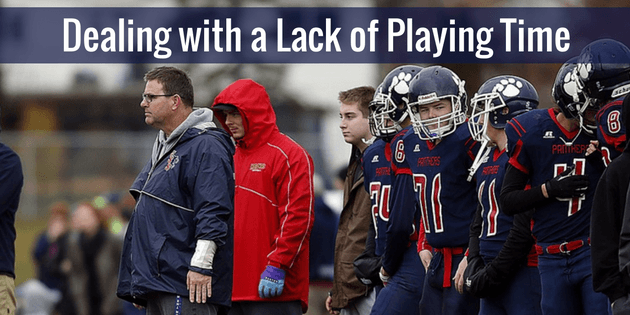
Dealing with a Lack of Playing Time
Recently, a mother of a player asked me about playing time.
Her son plays Sophomore (JV), is playing both ways, and is doing very well.
He was asked to dress for the varsity game on Friday night and he did.
The varsity team was winning by a lot and the coach put in all the players with the exception of him.
Both mom and player were frustrated that he did not get in.
So she wanted my opinion on the situation.
For me, there are a lot of things that I have learned in regards to playing time and coaches.
One of the biggest messages that I can give now that I have spent so much time learning how to coach others is that the ONLY PERSON you can control is yourself.
We as a society have gotten really good at blaming and questioning others because of social media, all the football commentary that is on tv these days and just the massive amounts of information that is out there for the general public to find.
Many feel that they know more than coaches.
Coaches have many reasons for how they decide on playing time.
One of the things that could have happened is that there were Juniors or Seniors that they had to play because they don’t have the opportunity on the Sophomore team.
This is just one reason that I came up with but there are many others.
Help your athletes learn to be grateful for the things that they have.
I am sure many other sophomores would have loved to just be able to put on a jersey and stand on the sidelines with all the fans there.
Finding an attitude of gratitude changes players very quickly and puts things in perspective.
It is incredibly tough to be a coach these days.
One reason is the amount of criticism that is placed on you by parents and players.
So with that said, I had given the advice that the best thing that a player can do when he does not reach the goal of getting the type of playing time he thinks he deserves is to place the frustration and anger on his own shoulders and use it as a chip to practice and play harder.
Again the only person that you can control is yourself.
In football, injuries, bad play, etc., happen all the time and players get replaced by others that sit in the weeds and work their ass off.
Tom Emma wrote an article that said a lot of what I agree with.
Even though it is about basketball, it holds true for all sports.
I encourage you to go to the link below and read the article. I am going to use his 8 suggestions and put my spin to each one.
But I encourage you to read his spin on it as well.
“Fortunately there are some proven strategies you can implement that will help you deal with the challenges and strong emotions that accompany not playing as much as you would like.” Excerpt from Thomas Emma http://www.coachesclipboard.net/LackPlayingTime.html
Tom had these 8 suggestions that he wrote about in the article listed above. I am responding to each with my own view point.
8 Strategies to Deal with a Lack of Playing Time
1. Ask Coach
Ask the coach what you can do better.
Don’t even mention playing or lack of playing time.
Make the focus on what it is that the coach would like you to do better and then that will give you something to really focus on in practice.
2. Keep Working
In life it is a proven fact that those that work harder are more successful than those that do not.
There are only a handful of athletes that are able to work to the highest extent of their ability.
All the rest of us have to continue to work harder.
This also includes working smarter.
The best way to work smarter is to listen to the coaches even if you disagree with them and to work towards the coaches method to the best of your ability.
Show the coach you care about what he or she has to say and work harder today than you did yesterday!
3. Always Remain Engaged and Ready Emotionally
This takes a lot of work not only on the practice field but also out of practice.
Study the plays, envision what the perfect plays look like, watch film, read material on how other athletes handle frustration, adversity and struggles of the game you play.
4. Keep it Quiet
Talk to your parents or a mentor that will keep it quiet.
The one thing that I have seen ruin morale on teams is players who complain and talk bad about others, including coaches.
The best thing you can do is to be a great teammate and support others including coaches.
Talk positively and strongly about the members on your team at all times. complaining is the biggest cancer that can happen to a team.
I know I had many complaints over the years I played.
I regret how I handled some of those instances because I can now see that it hurt my game when I was in the complaining mode.
5. Commit to Traversing the Razor’s Edge of Being a Good Teammate
I mentioned some of this above and that is to be a great teammate.
Don’t just be a good teammate, rise up to being a great teammate!
6. Always Maintain Your Passion for the Game
When you are on a losing team or you are not playing much this is a very difficult task.
This is where it is imperative to really dig deep into your core and find the passion for the love of the game.
Even on losing teams or not having playing time you can find games that you can be fully proud of the way you played and had fun.
You can also get a lot of enjoyment from practice if you turn the practice into a competition.
Finding competition is where I believe the fun comes from. Compete, compete, compete!!!
7. Help Your Direct Competition as Best You Can
Learning from and teaching others is a great asset to any team.
I get frustrated when I see a player who sulks or sits away from a team when they are either benched or they don’t get time in the game.
I have seen many players who have had that happen and they had a great attitude and helped others.
They kept their head in the game and improved their play from the sidelines in practice and as soon as the player ahead of them either gets hurt or their play decreases they come in and shine.
It is a long season.
Work hard and realize that you need to maximize every opportunity you get.
8. Take This Opportunity to Release From Self Absorption
Team sports are about the team.
Even gymnasts, swimmers and single sport athletes have a team of trainers and coaches and people supporting them.
Learning to be selfless and play for the greater good is a skill that will help you in your careers as well as your relationships that you have for the remainder of your life.
So use playing time as a chip on your shoulder to help you get more playing time as well as keep your playing time.
Football, and life for that matter, can change on a dime and you can be thrown curve balls, adversity and tragedy at any time.
Those players that learn how to handle these situations are the ones that become very successful people in life.
Use the game of football as a way to learn how to live life.
If you find yourself wanting more playing time, do yourself and your team a favor and Play Big using the techniques listed above.
Have a great day and remember to always “Play Big”





